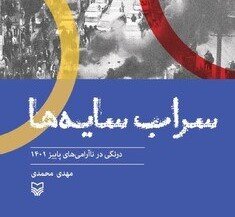Why the 2022 riots failed to bring Iran to its knees

TEHRAN - In the opening six chapters of 'Mirage of Shadows,' Mehdi Mohammadi delves into how the repercussions of the West's actions from the preceding two decades unfolded in the autumn of 2022.
He explores the events of that year, suggesting that the riots were orchestrated as a component of a larger scheme aimed at influencing Iran's strategic choices in the region.
The author revealed that in order to incite violent riots in 2022, the West and Israel decided to use a young and low-paid group of people who were willing to engage in illegal acts either for money or under the influence of fake propaganda.
The masterminds of the 2022 unrest then utilized a perfectly crafted strategy to prevent the riots from waning: creating casualties.
Based on intelligence reports, it has been uncovered that amid the chaos, an employee within Iran's Emergency Information Center assisted Western-based anti-Iran media in fabricating new victims purportedly killed during the riots.
This individual, a male, utilized his access to patient information in emergency rooms to selectively identify young females in distressing situations categorized as "delinquents" or those who had left their homes due to familial disagreements. By connecting these individuals with Western and Israeli agents posing as journalists, he received substantial payments from these media organizations.
The fake journalists then approached the families of these girls, falsely informing them that their daughters had been fatally shot by security forces during the unrest. Most families ended up believing the calls and agreed to hold interviews with Western media outlets. They even regurgitated what they had been guided to say by Israeli and Western agents.
In the last chapter of the book, Mohammadi explains why the 2022 riots that had been masterly orchestrated by spy services across the world ended up failing. He believes that the main reason for this lack of success should be attributed to the Leader of the Islamic Revolution and his quick understanding and management of the situation.
Ayatollah Seyyed Ali Khamenei decided to turn to “strategic patience.” He realized that a large-scale sedition was underway, and to neutralize it, Iran needed to take its steps very carefully and with great precision. The Leader believed that a grand cognitive war had been unleashed against the country, and, therefore, the people of Iran needed to see the reality of the situation for themselves with the passage of time.
What Ayatollah Khamenei predicted would happen ended up happening. The majority of people inside Iran who were supposed to feel compelled to join the riots eventually grew loathful of the situation. They were faced with an unprecedented wave of violence, profanity, and chaos. For most people inside Iran, the events of 2022 didn’t look to be headed towards rectification. They realized that what was happening on the other end was pure criminal and that the country would never be able to benefit from disorder and anarchy plaguing every corner of Iranian citizens’ lives.
Something else also happened that ended up benefiting the Islamic Republic and the people of Iran hugely. During the unrest of 2022 and the vast media campaigns against the country, citizens realized that there was no real or legitimate alternative to the current government. They watched how oppositionists were ready to sacrifice anything for a penny from the West, and that the West and Israel did not have the interests of Iranians at heart.
Many who turned their backs on rioters that year were actually avid critics of the Iranian government. However, they realized that even if the government is unable to fill the gaps in some areas, the Islamic Republic is still the best option for making the country ascendant.
The West couldn’t wreak havoc in Iran and sentence it to the same fate as Iraq and Afghanistan because Iranians were well aware that nothing good could ever come out of solutions put forth by hegemonic powers seeking to exploit their country’s resources.
